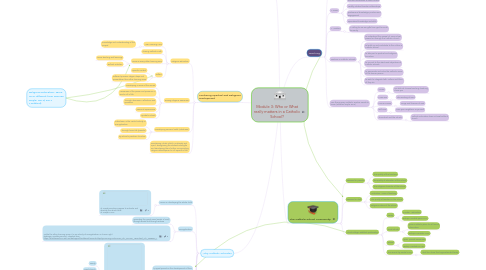
1. Spirituality
1.1. Evangelisation loses its effectiveness if
1.1.1. does not take into account the actual people to whom it addresses
1.1.1.1. Generation z
1.1.1.1.1. Always connected to each other
1.1.1.1.2. most positive aspect of school life is socialisation
1.2. Is the search for ourselves, our purpose in life, what we are here to learn and what we are here to teach others. Identity, Who I am?
1.3. Religious Faith
1.3.1. The pathway in which we go to grow into our true self
2. Nurturing Spiritual and Religious Devlopment
2.1. Religious Education
2.1.1. Main Learning Area
2.1.1.1. Knowledge and Understanding of the Gospel
2.1.2. Sharing Catholic Faith
2.1.3. Same as every other learning area
2.1.3.1. Same teaching and learnings
2.1.3.2. Brilliant activities
2.1.4. Differs
2.1.4.1. Specific content
2.1.4.2. Different process, stages, steps and presentation than other learning areas
2.2. Raising religious awareness
2.2.1. Developing a sense of the sacred
2.2.2. Awareness of the power and presence of God in all of life
2.2.3. Through discussion, reflections and questions
2.2.4. personal experiences
2.2.5. Symbols, Rituals
2.3. Developing Personal Faith (catechesis)
2.3.1. Catechesis: is the central activity of evangelisation
2.3.2. Through home life (parents)
2.3.3. By schools, parishes, churches
2.4. Developing Whole Child, Mind Body and Spirit. Recognising the students strengths and developing them further, incorporating religious development in all aspects of life
3. Why Catholic Schools?
3.1. Focus on developing the whole child
3.1.1. St Josephs Bunbury aspires to educate and develop the whole child. St Joseph's CPS
3.2. Evangelisation
3.2.1. Spreading the good news (words of God) through words and through witness
3.2.2. Unlike the other learning areas, it is an activity of evangelisation in its own right (Bishops Mandate para 62) Adapted from https://blackboard.ecu.edu.au/webapps/blackboard/execute/displayLearningUnit?course_id=_627832_1&content_id=_4988969_1
3.3. to assist parents in the development of their children
3.3.1. It takes a whole village to raise a child
3.3.1.1. Family
3.3.1.2. Local Church
3.3.1.3. School
3.4. to fosters a christian mentality
3.4.1. To create a relationship between faith and culture
3.5. to offer educational choice
3.6. to be models of genuine communities
3.6.1. Reasons for parents
4. Religious Education: same as or different from Damien Doyle, 2010( 2014 Modified).
5. The Catholic School Community
5.1. Reasons for parents
5.1.1. The quality of the teachers
5.1.2. the quality of education at the school
5.1.3. The religious character of the school
5.2. Reasons for staff
5.2.1. Motivation : Love of teaching
5.2.2. The quality of teachers in the school
5.2.3. Religious nature of the school
5.3. Whole village: Establish partnership
5.3.1. Family
5.3.1.1. number 1 educators
5.3.1.2. Bishop Mandate para 75-77
5.3.2. Local Church
5.3.2.1. gives a catholic place for all formal information
5.3.2.2. Bishops Mandate 79-84
5.3.3. School
5.3.3.1. gives parents awareness
5.3.3.2. Bishop Mandate 94-100
5.3.4. The record, by Rachel Curry
5.3.4.1. I feel like I have this huge extended family
6. Teaching
6.1. A Job
6.1.1. You just do for the money
6.1.2. a Back up plan etc
6.2. A career
6.2.1. love and motivation to teach others
6.2.2. Healthy student teacher relationships
6.2.3. professional knowledge, practice and engagement
6.2.4. Specialised knowledge and skills
6.3. A Vocation
6.3.1. A calling to use our gifts from god to enrich humanity
6.4. Teachers in Catholic Schools
6.4.1. to understand the Gospel of Jesus Christ passed on through the Catholic Church
6.4.2. to build up and contribute to the culture a Catholic school
6.4.3. to take part in spiritual and religious formation
6.4.4. to commit to the ideals and objectives of Catholic schools
6.4.5. to appreciate and value the Catholic vision of the human person
6.4.6. to work to integrate faith, culture and life in all they do
6.5. Five things every Catholic Teacher needs to know (Jonathan Doyle 2013)
6.5.1. Vocare
6.5.1.1. You did not choose teaching, teaching chose you
6.5.2. Misso Dei
6.5.2.1. The sending of God
6.5.3. Human Person
6.5.3.1. Image and likeness of God
6.5.4. Self Care
6.5.4.1. Love your neighbour as yourself
6.5.5. The school and the Church
6.5.5.1. Catholic Education does not exist without church
